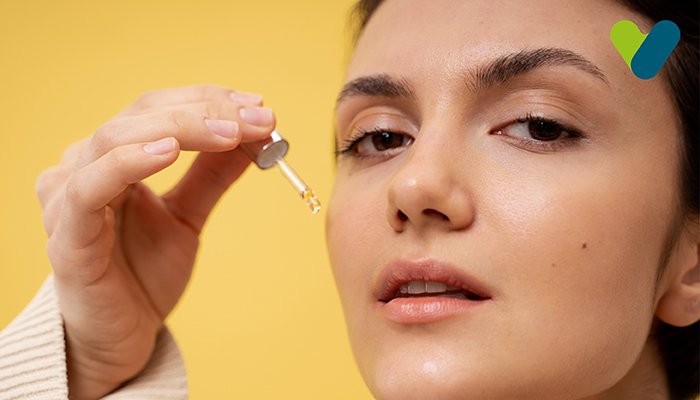Introduction
Reshma is a makeup influencer. He has quite a good amount of followers on her social media platform. One fine day she woke up with rash and spottings on her skin. She ignored it for a few days, thinking it was probably due to the chemicals in the makeup products. But as the skin condition grew severe, she got agitated. She immediately went to a dermatologist to get he skin checked. After the diagnosis, it was revealed that she was suffering from niacinamide deficiency, which is a form of vitamin B-3 and caused rashes and spottings. The doctor prescribed her dosage of nicotinamide which is the same as niacinamide. She also warned Reshma of niacinamide side effects.
Niacinamide, also known by names like nicotinamide, is an essential nutrient for the body and skin. Keep reading this blog post to know everything about niacinamide, including the side effects of nicotinamide.
What is Niacinamide?
There are 8 forms of vitamin B. Of these 8, Vitamin B 3 is an essential nutrient and supplement for our body and better bodily functions. Vitamin B 3 is also called 'niacin'. This niacin further has two forms- niacinamide, also called nicotinamide and nicotinic acid. Niacin is vital for our body as it looks after brain functions, lowers cholesterol, helps treat arthritis, helps in kidney functions, deals with skin conditions, etc.The bottom line is that niacinamide is an essential nutrient to the body. It is a form of vitamin B 3, also called niacin. As beneficial for the body, too much or too little niacin in the body can show niacin side effects or nicotinic acid side effects.
Symptoms of Niacin Deficiency
Niacin deficiency is caused when the body loses the ability to absorb niacin from vitamin B 3 rich food or when the body doesn't get enough niacin. Though niacin deficiency can be rare around the world, where there is food scarcity and high levels of malnourishment, niacin deficiency outbreaks have been seen.Severe deficiency of niacin is called pellagra, which can become fatal if not treated in time. This pellagra can cause symptoms related to the skin, nervous system, and digestive system. The symptoms are-
- Scaly and thick pigmented rash on the skin
- Vomiting
- Diarrhoea
- Apathy
- Swollen mouth
- Bright red tongue
- Depression
- Fatigue
- Memory loss
- Disorientation
Side Effects
Though niacinamide, also called nicotinamide, can be applied topically and taken orally, it works best when used topically on the skin and is exceptionally healthy for the skin.Following are the niacinamide side effects or side effects of nicotinamide for consumption of supplements-
- Diarrhoea
- Dizziness
- Itchiness
- Flatulence
- Heartburn
- Mild headaches
- Redness
- Burning
- Mild itching
We have also studied that another form of vitamin B 3 is nicotinic acid. Let us look at some of the common niacin side effects or nicotinic acid side effects-
- Skin flushing
- Irregular or rapid heartbeat
- Dry or scaly skin or even boils
- Sudden darkening or thickening of the skin
- Headache
- Dizziness
- Itch or a rash
- Nausea and vomiting
- Diarrhoea
- Nervousness
- Heartburn
- Flatulence
- Yellowing of the skin or eyes
- Shortness of breath
- Difficulty in seeing
- Painful swollen joints or other signs of gout
- Fainting
- Sudden dizziness when getting up from a sitting or lying position
Uses of niacinamide
- It is essential in treating pellagra which is the severe deficiency of niacin. Although nicotinic acid can also be used, niacinamide is considered a better alternative as it doesn't cause side effects like nicotinic acid side effects.
- Due to its anti-inflammatory properties, niacinamide helps treat acne.
- It has been seen that niacinamide effectively reduces the risk of developing skin cancers.
- In the prediabetic and early stages of type 1 diabetes, the intake of niacinamide effectively prevents and treats it.
- Other uses for niacinamide are treating osteoarthritis, decreasing pigmentation, dealing with melasma and helping with hyperphosphatemia.
The side effects of nicotinamide shouldn't be looked upon casually. These side effects can actually be a lot more than serious than you think. Niacinamide or nicotinamide is very beneficial for our body as they serve some crucial purposes in order to continue bodily functions smoothly. Nicotinamide is very helpful in treating preventing certain diseases and conditions like diabetes, cancer, hyperpigmentation, pellagra, etc. One must ensure to take vitamin B 3 rich foods or doctor prescribed niacin supplements to avoid niacin deficiency.


